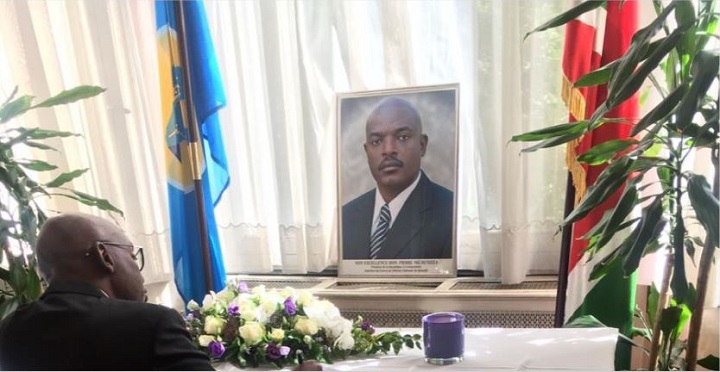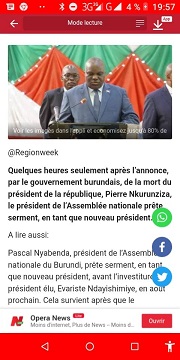Uncertainty and rumours after Burundi president dies unexpectedly


ASCL researcher Lidewyde Berckmoes is an anthropologist and carries out research on regional conflict in Africa, particularly in Burundi and the Great Lakes region.
‘Le Gouvernement de la République du Burundi annonce avec une très grande tristesse aux Burundais et a la Communauté Internationale, le décès inopiné de Son Excellence Pierre Nkurunziza, Président de la République du Burundi…survenu à l’Hôpital Cinquantenaire « Natwe Turashoboye » de KARUZI, suite a un arrêt cardiaque.’ (Secretary General of the Government and Spokesperson of the Government, 9 June 2020)
Last week on 9 June, Burundians in the country, in exile and as part of the wider diaspora received the unexpected news that Burundi’s president Pierre Nkurunziza had passed away. The news came only days after the publication of the electoral results that announced the name of the newly elected president. After 15 years of rule, Nkurunziza was planning to leave the position to General Évariste Ndayishimiye, a party loyalist who, together with Nkurunziza, has fought in the civil war rebellion (1993-2005). Yet Nkurunziza’s plan was not to leave the stage entirely. He was to become the ‘supreme guide’ of the country, a position that would give him wide influence on the rule of his successors.
Many enemies
His unexpected death at the young age of 55 gives rise to a new wave of uncertainty and rumours. It seems nobody can believe the cause of death really is a heart attack. Has he been poisoned or is he the first head of state to succumb to COVID-19? Over the years, he certainly made many enemies. Especially since the controversial elections 5 years ago, which led to the death and disappearance of thousands and displacement of hundreds of thousands, Burundians have been increasingly divided into supporters and enemies of the ruling party CNDD-FDD. Moreover, the past five years have been hard on people in Burundi, as they increasingly struggle with the country’s isolation and growing levels of unemployment and poverty. Burundi can now effectively call itself the poorest country in the world in terms of purchasing power (Jeune Afrique, 13 June 2020, based on World Bank statistics).

Few measures to curb the pandemic
Alternatively, the downplaying of and silence on the impact of the COVID-19 pandemic, as well as the unconfirmed information about the late president’s wife and other close family members suffering from COVID-19 feed rumours about the pandemic being the real cause of death. In contrast to many of its neighbours, Burundi has taken very few measures to curb the pandemic. Save some restrictions in cross-border movements, people have been circulating as usual. Notably, during the electoral campaign, gatherings by the ruling party and one of the main opposition parties brought together thousands of people all over the country. In speeches, the president said that the country was protected from COVID-19 by God. Nonetheless, some voices from inside and outside started expressing concern about real versus official numbers of COVID-19 patients and deaths. And people started speculating whether official numbers would spike after the electoral campaign was over.

Uncertainty about 'interim' period
Uncertainty and rumours also prevail about the interim period. Some people I spoke to in Burundi are not sure whether the 2005 constitution or the 2018 amendments made to this constitution will be followed to designate the interim president. In line with stipulations of the 2018 amendments, a fake news announcement mentioned that the head of the national assembly, Pascal Nyabenda, had taken oath merely hours after the announcement of Nkurunziza’s death. He is seen as in the camp of Nkurunziza, as the latter had first proposed him instead of the current president-elect as the presidential candidate to run for elections. Other rumours online suggested that Nyabenda along with other high officials are also suffering from COVID-19 and can therefore not take the position of interim president. Others again argue that instead the president-elect may take his oath earlier than August, and avoid rule of an interim altogether. Uncertainty following widespread critique on this years’ elections, at least, seems to have been cut short with these new developments.

Civil war
Meanwhile in Burundi, a young man I spoke to shared his impression of the atmosphere in the capital:
‘Yes that [news] was shocking. Everybody is in silence. We do not know what will happen after, only that we have to find our way home as soon as possible.’ (From Bujumbura, 9 June 2020)
In his early thirties now, this young man has learned from experience that events like these may unleash mass violence. His earliest experience was when the untimely death of the democratically elected president in 1993, Melchior Ndadaye, served as starting signal of a decade-long civil war. At the time, the young man, like many of his peers, had to flee on multiple occasions to the mountains surrounding Bujumbura or cross-border. Nonetheless, now in Burundi, a week after the death of the president, things still appear to be ‘calm’ (young woman, thirties, Bujumbura, 16 June 2020). People are waiting for the next steps.
More and more autocratic
 As we see often, death gives rise to reflections on one’s accomplishments during life. Burundians and Burundi-scholars express their views and opinions on various social media platforms and in newspapers. On ‘The Conversation’, a colleague from Université Paris 1 Panthéon-Sorbonne called the legacy of Nkurunziza ‘heavy’. In terms of who is in power and who has access to education, for instance, changes that have occurred in Burundi since Nkurunziza started his rule in 2005 are significant. Yet especially after the presidents’ first term, thus over the past ten years, rule has become more and more autocratic. In 2010, independent media still flourished, and people were discussing their political positions and preferences relatively openly. In the years to follow, the topic was increasingly avoided or for public display only. Independent media have been largely shut down. Journalists and civil society members have been persecuted, and many live in exile. People I know to be disinterested in party politics or to be against the ruling party, are prominently exhibiting political party artifacts in their homes as a sign of loyalty, or have joined the ruling party youth league to pretend allegiance. In the same vein, on Facebook and through WhatsApp or Instagram today we see a great number of mournful messages, like ‘I will never forget his advice and his wisdom. An extraordinary Patriot,’ and ‘May God listen to our prayer for our country’ – but not all are by mourning people.
As we see often, death gives rise to reflections on one’s accomplishments during life. Burundians and Burundi-scholars express their views and opinions on various social media platforms and in newspapers. On ‘The Conversation’, a colleague from Université Paris 1 Panthéon-Sorbonne called the legacy of Nkurunziza ‘heavy’. In terms of who is in power and who has access to education, for instance, changes that have occurred in Burundi since Nkurunziza started his rule in 2005 are significant. Yet especially after the presidents’ first term, thus over the past ten years, rule has become more and more autocratic. In 2010, independent media still flourished, and people were discussing their political positions and preferences relatively openly. In the years to follow, the topic was increasingly avoided or for public display only. Independent media have been largely shut down. Journalists and civil society members have been persecuted, and many live in exile. People I know to be disinterested in party politics or to be against the ruling party, are prominently exhibiting political party artifacts in their homes as a sign of loyalty, or have joined the ruling party youth league to pretend allegiance. In the same vein, on Facebook and through WhatsApp or Instagram today we see a great number of mournful messages, like ‘I will never forget his advice and his wisdom. An extraordinary Patriot,’ and ‘May God listen to our prayer for our country’ – but not all are by mourning people.
In the diaspora, it seems, some people feel more confident to share critical messages about the president’s life course. As such, a young woman of Burundian descent in Belgium, posted a five-minute video about her contempt for the president’s actions on Instagram. While his reasons for pursuing change through rebellion was legitimate, she states, and his own childhood suffering of injustices should not be forgotten, he does not deserve the attention she grants him reflecting on his life, as many youths of her generation whose blood is on his hands, have not received such honour either (paraphrased, 15 June 2020).
Newly elected president a reformer?
Among scholars, some relief is expressed in that the newly elected president, who is known as a ‘moderate,’ will not have to rule with his ‘father’ looking over his shoulder. He will be able to make reforms without Nkurunziza blocking these. And, he can be held accountable for his rule. As a young Burundian academic explained:
‘…[H]e was called: ‘the heir’. In Burundi culture, the heir gets full power after the death of his father’ (Whatsapp, 9 June 2020). Yet other young people in exile are less optimistic: ‘No there is no change. I think because the system still reigns…’ (Young man, DRC, 11 June 2020).
The latest news holds that the constitutional court judged against interim rule; the president-elect can start his term earlier. On Thursday 18 June 2020, Évariste Ndayishimiye is to take oath in Gitega, Burundi’s capital city since one and a half year. Whether his rule will allow Burundians in the country and abroad to improve their lives and livelihoods, however, remains a question full of hope.
Would you like to stay updated on new blog posts in the ASCL Africanist Blog? Subscribe here! Would you like to comment? Please do! The ASCL reserves the right to edit, shorten or reject submitted comments. Read our blog posts dealing with COVID-19.
Top photo: Ambassador Alain Aime Nyamitwe, Special Advisor to the Executive Secretary and Head of the African Union Liaison Office in Addis Ababa, signs the condolence register at the Embassy of Burundi in Brussels. Photo: Twitter.
Upper photo left: ‘COVID-19 statistics 11 June 2020,’ Ministry of Public Health, Burundi.
Upper photo right: fake news on social media.
Lower two photos: pictures of mourning on social media.


Add new comment